 The Reading Challenge continues!!
The Reading Challenge continues!!With 50 books to check off (52 actually, since one category is a trilogy), I need to read approximately four and a half books a month to complete the challenge. With some books being longer or more difficult than others, I'm doing my best to check off as many books as month as possible.
This month I read seven.
 Silence by Shusaku Endo (A book set somewhere you've always wanted to visit)
Silence by Shusaku Endo (A book set somewhere you've always wanted to visit)I've been wanting to re-read this book for a while now. I first read it a few years ago when I was in the throes of spiritual uncertainty, and it literally changed my life. Now that I have moved on from there, I wanted to read it again to see how it would affect me now. Here is the comprehensive review I wrote about the book when I finished it the second time.
I was able to tick off a box in the reading challenge because Japan is a place I have always wanted to visit. From obento to kokeshi, I've had a long-standing fascination with Japanese trends. One day we will visit. Until then, I'll read books.
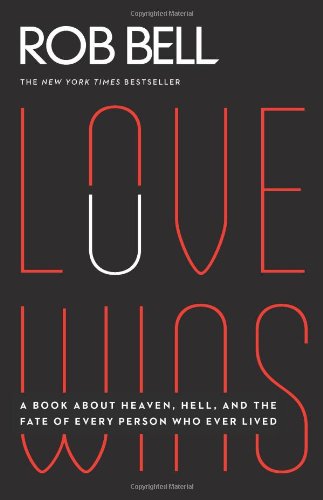
Love Wins by Rob Bell (A book with bad reviews)
In my Christian days, I loved me some Rob Bell. We watched all the Nooma videos at Bible studies, and some of them blew my mind. His way of explaining the Bible intellectually and putting Biblical stories into their proper historical context were enlightening to me. (And those videos - Can't we all remember that moment when the car pulled out of the airport parking lot? We all do.) He is educated and insightful and - to sheepishly borrow a Christian buzzword - relevant. So I have an immense amount of respect for Rob Bell.
Then suddenly, with the release of Love Wins, everyone's favorite hipster pastor "fell from grace". Suddenly he was the Church's greatest insider enemy. Mainstream evangelicals shunned him. They hated this book. So, of course, I wanted to know what all the fuss was about. I ordered the book.
Love Wins proposes an alternate concept of hell from the usual lake of fire/ separation from God/ eternal punishment and torture bit. Bell goes back to Scriptural mentions of hell - which is pretty sparce; Sheol, Hades and Gehenna are actually not appropriately translated into the Heaven's Gates Hell's Flames version of the everlasting fiery torment we think of today. Bell then proposes a different idea of what might befall the ungodly - but I'll let you read the book to see what that is.
I really liked the book. However, I had two complaints. The first is Bell's assumption that you are either a loving, good, at-peace person with Jesus or you are a discontent, lonely, depressed (and then of course, possibly downright bad) person without Jesus. While he admits there are very good people who do not follow Jesus (and that there are some very bad people who do), he seems to assume those good people are still wandering around aimlessly, looking for that ultimate fulfillment that will give their lives meaning. I beg to differ.
The second complaint, though, is that while he used a lot of Scripture - and the very modern, mainstream concept of a loving God - to back up his points, he seemed to gloss over all the not very loving aspects of God all through Scripture, particularly in the Old Testament. If I were still a mainstream evangelical, I'd have thought of it more as glossing over "the wrath of God", the part of God that wants to punish all the people who didn't follow him. As a Calvinist, I'd have laughed the whole book right off. However, IF God is the God of Love Bell describes in the book, then his book would be pretty close to the mark. IF there is a God and IF he is all-loving, then Bell's assessment that eternal torture is not compatible with His nature would have to be pretty near spot on.
If the subject of hell bothers you, I'd recommend picking up this book. It's an easy read, despite the heavy subject matter, written in a very "bloggy" style. And Bell is just so darn charming. I'm glad he's still out there, despite all the backlash, being relevant in the Christian world.
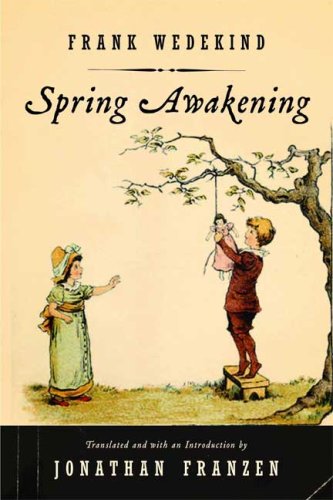 Spring Awakening by Frank Wedekind(A play)
Spring Awakening by Frank Wedekind(A play)The day I was finishing Love Wins, my copy of Spring Awakening arrived in the mail. Even though it was about 11:30 at night when I finished Love Wins, I was eager to read this little play, so I dove straight into it and read it in one sitting. It was about 2am before I got to bed that night.
A little personal background. I first heard of Spring Awakening as a rock musical. When I was doing Footloose, my first return to amateur dramatics in Scotland, another local drama group was holding adutions for SA. I didn't audition, because I was already in a musical, but also because I knew nothing about it. Curious, though, I bought the soundtrack and went to see my new friends perform it when the time came. Turns out, the musical (based on this German play from 1891) was shockingly controversial. I actually found myself cringing horribly at some parts. The music is great though and the subject matter important. I found it hard to believe that this was actually based on a play from the 19th century, so for a while I'd been wanting to get my hands on the original.
Surprisingly, shockingly even, the original play is even more gritty.
Basically, the rock musical deals with homosexuality, teen sexuality and pregnancy, suicide, sexual abuse, masturbation and abortion. The play deals with all of those topics PLUS masochism, sadism, and child prostitution, all thrown in with a dash of dark humor. Ouch. Even the modern rock musical doesn't try to be funny about it. Even the modern musical softens Wendla Bergman's taste for masochism and Melchior Gabor's blatant rape scene (which is performed as not rape in the musical). The musical ages the characters too; the original play has the children ranging from eleven to fourteen.
I'll just say this book was disturbing but intriguing. It's almost impossible to imagine a 19th century writer with the cajones to shamelessly write about gay romps in the grass and circle jerking with such bluntness, and particularly for the stage! Not to mention the unsettling mental health issues so many of the child characters display. And then to do it all with a twisted dark humor...
It was a good play.
(And the musical is good too.)
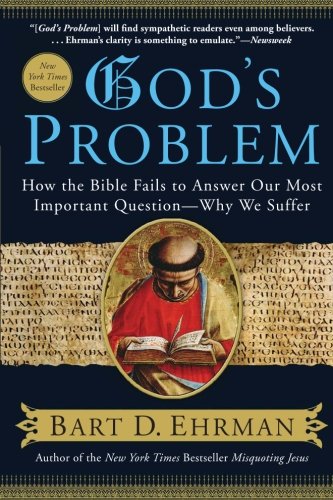 God's Problem: How the Bible Fails to Answer Our Most Important Question--Why We Suffer by Bart Ehrman (A book you own but have never read)
God's Problem: How the Bible Fails to Answer Our Most Important Question--Why We Suffer by Bart Ehrman (A book you own but have never read)Originally, I was going to check off "A book a friend recommended" but when I told that friend I'd read it, he said he had actually recommended a different book. Oops.
I own a lot of Bart Ehrman books. Ehrman is a New Testament scholar and professor at the University of North Carolina at Chapel Hill. I first heard of him on NPR discussing his most recent book How Jesus Became God with Terry Gross on Fresh Air. I subsequently ordered that book and read it, followed by several others of his. Ehrman is an agnostic, who left evangelical Christianity after attending three religious colleges and universities. He alludes to his reasons for leaving Christianity in his other books but said that the full story is fleshed out in God's Problem in which he discusses the problem of suffering. I've had this book on my shelf for about a year now and finally decided to read it.
This book is a very, very thorough review of the Biblical answers to why we suffer. He moves through Old and New Testament authors and demonstrates their understanding of why we suffer. The answers are all very different from one another and actually very comprehensive, even while being contradictory. From believing suffering comes from God as punishment for sin to coming from the forces of Satan to being a matter of free will to being a result of living in a fallen world to being a means of bringing us closer to God to having literally no meaning whatsoever, the Bible seems to have covered basically every reason we can think of for why there is suffering in the world.
The problem Ehrman has, and that I share with him, is that none of these explanations are compatible with an all powerful, all loving God. And none of these explanations - with the exception perhaps of Ecclesiastes which basically says suffering just happens and it totally sucks - are satisfactory. Some are even appalling. It was this problem with suffering that led Ehrman to eventually leave the faith altogether. It also resonates deeply with me, being a problem I wrestled with often: How can an all-powerful, all-loving God allow so many African children to starve daily, allow tsunamis and earthquakes to kill millions of innocent people yearly, allow so much unbearable, senseless pain and suffering without lifting a finger to do anything about it? The "answers" are all there in the Bible, but none of them are good enough. None of them really cut to the chase.
In fact, this book echos back the problem of God's silence in Endo's book too. From Silence to Love Wins to God's Problem, there was a definite trend going on in my February reading - can God truly be a loving God if he remains silent during suffering or punishes millions upon millions of people for eternity just for getting the details wrong?
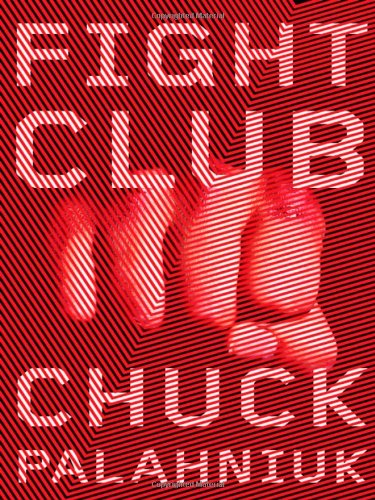 Fight Club by Chuck Palahniuk (A book that became a movie)
Fight Club by Chuck Palahniuk (A book that became a movie)After four rather emotionally exhausting books, I decided it was time for some fluff. My friend Elizabeth loaned me Fight Club. After reading a fan site claiming that Marla is not real, Scott and I went back and watched the movie again. Then I read the book. (For the record, I'm still on the fence about Marla. Mebbe, mebbe not.) It was a good book, but of course, having seen the movie already a dozen times, there were no surprises. I'd have liked to have read this book before ever seeing the movie, then allowing the movie to amaze me even further. Regardless, it's one of those books I'm pleased to say I've now read. Makes me feel more movie-literate, if that's even a thing. I can't really discuss much about the book (or the movie) without spoilers, but then seriously, if you haven't already seen it, I have to wonder if you've been living in a cave.
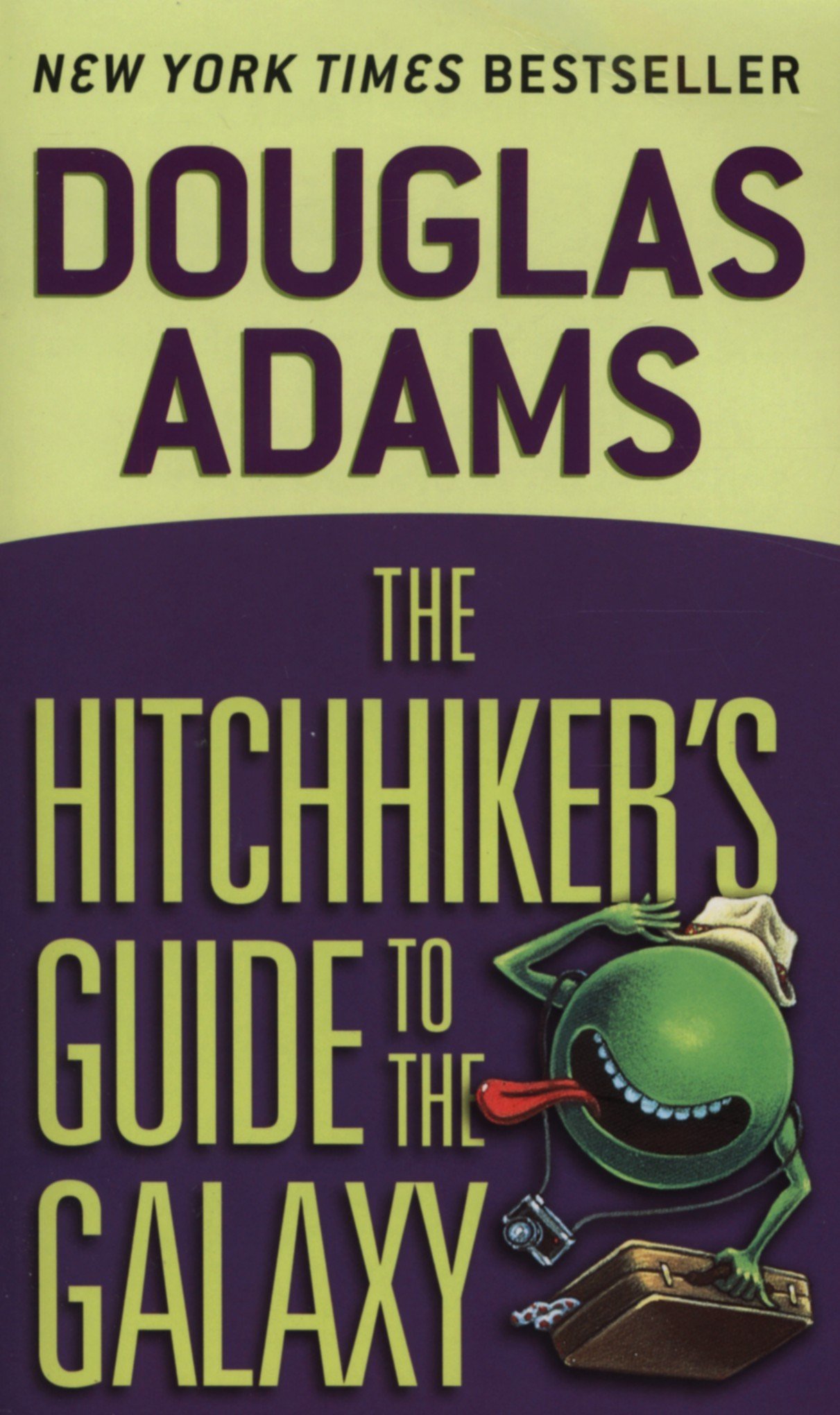 The Hitchhiker's Guide to the Galaxy by Douglas Adams (A book with nonhuman characters)
The Hitchhiker's Guide to the Galaxy by Douglas Adams (A book with nonhuman characters)Following Book Club, where this book came up, another friend Tosha dropped her copy off in my mailbox for me to read. She was sure I'd love it, having lived Britishly myself for several years. (She too is married to a Scotsman.) This is one of Scott's favorite books, so it was high time I read it anyway. It was, however, one of those books that has been so built up for me that I was afraid reading it would be a disappointment.
After literally LOLing three times in the first chapter, though, I figured that wasn't much of a concern.
This book is funny. It is absurd. It is modern day, sci-fi Candide. I read through it quickly and immediately started in on the second book of the series Restaurant at the End of the Universe. The story of human Arthur Dent saved from the obliteration of Earth in the process of creating a galactic bypass (plans of which had already been scrapped, oops) as he hitchhikes through the galaxy with humanoid alien Ford Prefect, ex-Galactic President Zaphod Beeblebrox and fellow human Trillian is unpredictable, improbable and hilarious. The Britishness of the humor makes me feel warmly back in Scotland in turtleneck jumper drinking a perfect cup of tea. I'm eager to read the rest of the series, which may or may not tick off any more boxes of the Reading Challenge but will certainly be worth my time! So fluffily, funnily delightful!
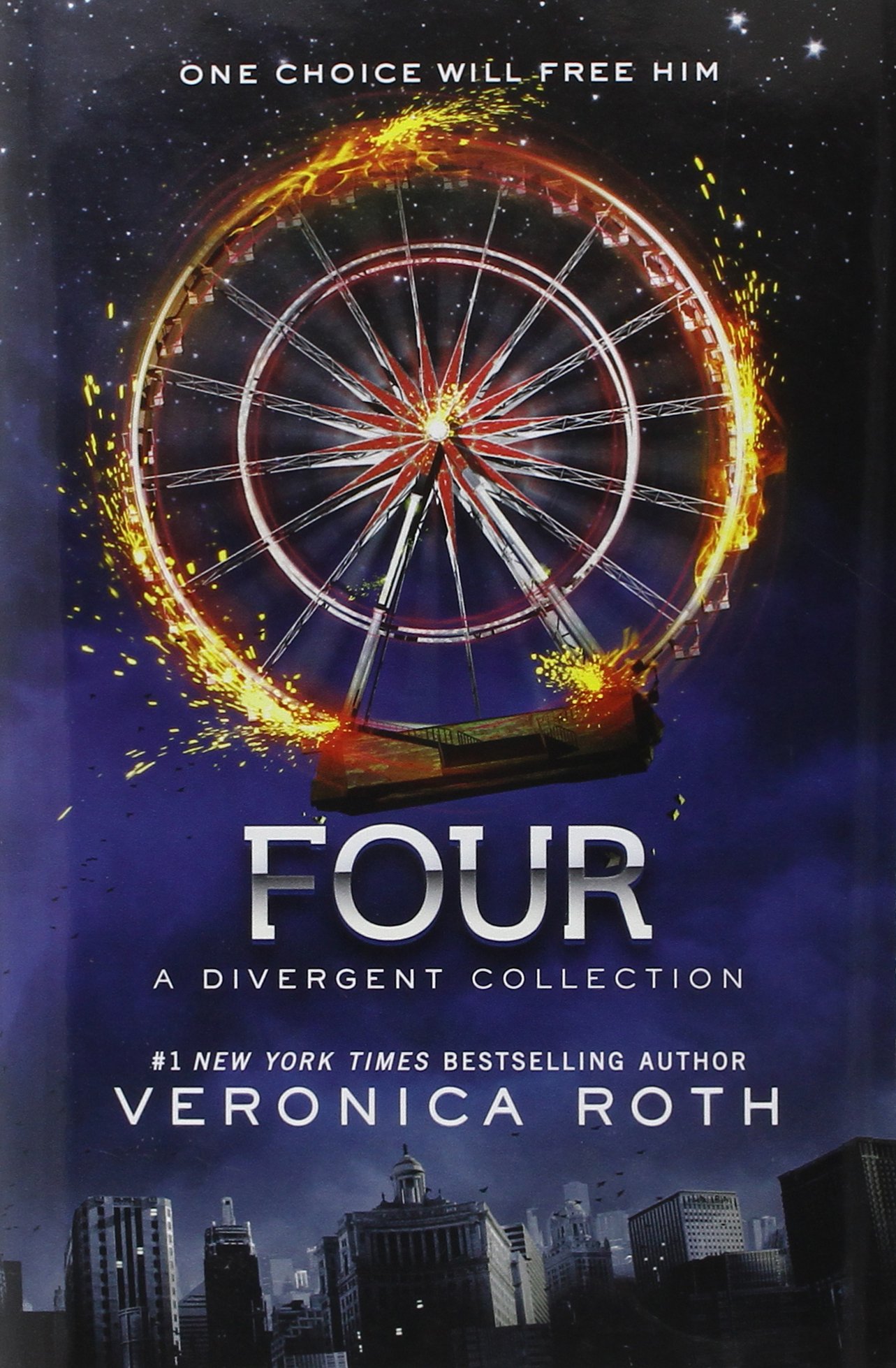 Four by Veronica Roth (A book with a one-word title)
Four by Veronica Roth (A book with a one-word title)I'm not one to read two books at once, but I saw Four at the library, and even though I'm currently in the middle of Restaurant at the End of the Universe, I checked it out and read it in two days. Like the rest of the Divergent series, it's an energetic, fast-paced story that keeps you turning pages until you are through. This book gives some prequel story lines about the character Four that we meet in the earlier books. Four is a really interesting character, so I'm sure I speak for all fans when I say I'm glad she wrote this book, telling us more about him.
My only complaint - and it was one of my complaints about Allegian too - is that Four doesn't have his own voice. He speaks and thinks just like Tris, using the same imagery and descriptions. That's not a character fault, though, it's an author's. I can't blame Four for it. (I kind of love him.) Regardless, it was easy to push that little bit of literary snobbery aside and just enjoy the plot line.
(Okay listen. If we were playing Truth or Dare, and you asked me who my fictional crush is, I'd have to say Four. There. The truth is out.)
So the Reading Challenge continues. 13 books down, 39 to go! Anyone else willing to jump in?
To see what else I have read this year:
January
No comments:
Post a Comment
Leave your comments here.